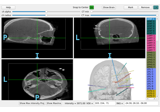mne.gui.locate_ieeg#
- mne.gui.locate_ieeg(info, trans, aligned_ct, subject=None, subjects_dir=None, groups=None, show=True, block=False, verbose=None)[source]#
Locate intracranial electrode contacts.
- Parameters:
- info
mne.Info The
mne.Infoobject with information about the sensors and methods of measurement.- trans
str|dict| instance ofTransform If str, the path to the head<->MRI transform
*-trans.fiffile produced during coregistration. Can also be'fsaverage'to use the built-in fsaverage transformation.- aligned_ctpath-like |
nibabel.spatialimages.SpatialImage The CT image that has been aligned to the Freesurfer T1. Path-like inputs and nibabel image objects are supported.
- subject
str The FreeSurfer subject name.
- subjects_dirpath-like |
None The path to the directory containing the FreeSurfer subjects reconstructions. If
None, defaults to theSUBJECTS_DIRenvironment variable.- groups
dict|None A dictionary with channels as keys and their group index as values. If None, the groups will be inferred by the channel names. Channel names must have a format like
LAMY 7where a string prefix likeLAMYprecedes a numeric index like7. If the channels are formatted improperly, group plotting will work incorrectly. Group assignments can be adjusted in the GUI.- show
bool Show the GUI if True.
- block
bool Whether to halt program execution until the figure is closed.
- verbose
bool|str|int|None Control verbosity of the logging output. If
None, use the default verbosity level. See the logging documentation andmne.verbose()for details. Should only be passed as a keyword argument.
- info
- Returns:
- guiinstance of IntracranialElectrodeLocator
The graphical user interface (GUI) window.
